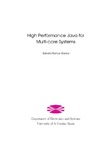Mostrar o rexistro simple do ítem
High performance Java for multi-core systems
| dc.contributor.advisor | López Taboada, Guillermo | |
| dc.contributor.advisor | Touriño Domínguez, Juan | |
| dc.contributor.author | Ramos Garea, Sabela | |
| dc.date.accessioned | 2013-10-22T10:17:00Z | |
| dc.date.available | 2013-10-22T10:17:00Z | |
| dc.date.issued | 2013 | |
| dc.identifier.uri | http://hdl.handle.net/2183/11547 | |
| dc.description.abstract | [Abstract] The interest in Java within the High Performance Computing (HPC) community has been rising during the last years thanks to its noticeable performance improvements and its productivity features. In a context where the trend to increase the number of cores per processor is leading to the generalization of many-core processors and accelerators, multithreading as an inherent feature of the language makes Java extremely interesting to exploit the performance provided by multi- and manycore architectures. This PhD Thesis presents a thorough analysis of the current state of the art regarding multi- and many-core programming in Java and provides the design, implementation and evaluation of several solutions to enable Java for the many-core era. To achieve this, a shared memory message-passing solution has been implemented to provide shared memory programming with the scalability of distributed memory paradigms, also with the benefits of a portable programming model that allows the developed codes to be run on distributed memory systems. Moreover, representative collective operations, involving computation and communication among different processes or threads, have been optimized, also introducing in Java new features for scalability from the MPI 3.0 specification, namely nonblocking collectives. Regarding the exploitation of many-core architectures, the lack of direct Java support forces to resort to wrappers or higher-level solutions to translate Java code into CUDA or OpenCL. The most relevant among these solutions have been evaluated and thoroughly analyzed in terms of performance and productivity. Guidelines for taking advantage of shared memory environments have been derived during the analysis and development of the proposed solutions, and the main conclusion is that the use of Java for shared memory programming on multi- and many-core systems is not only productive but also can provide high performance competitive results. However, in order to effectively take advantage of the underlying multi- and many-core architectures, the key is the availability of optimized middleware that abstracts multithreading details from the user, like the one proposed in this Thesis, and the optimization of common operations like collective communications. | es_ES |
| dc.language.iso | eng | es_ES |
| dc.rights | Os titulares dos dereitos de propiedade intelectual autorizan a visualización do contido desta tese a través de Internet, así como a súa reproducción, gravación en soporte informático ou impresión para o seu uso privado e/ou con fins de estudo e de investigación. En nengún caso se permite o uso lucrativo deste documento. Estos dereitos afectan tanto ó resumo da tese como o seu contido Los titulares de los derechos de propiedad intelectual autorizan la visualización del contenido de esta tesis a través de Internet, así como su repoducción, grabación en soporte informático o impresión para su uso privado o con fines de investigación. En ningún caso se permite el uso lucrativo de este documento. Estos derechos afectan tanto al resumen de la tesis como a su contenido | es_ES |
| dc.title | High performance Java for multi-core systems | es_ES |
| dc.type | info:eu-repo/semantics/doctoralThesis | es_ES |
| dc.rights.access | info:eu-repo/semantics/openAccess | es_ES |
Ficheiros no ítem
Este ítem aparece na(s) seguinte(s) colección(s)
-
Teses de doutoramento [2122]






